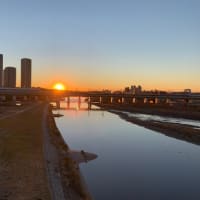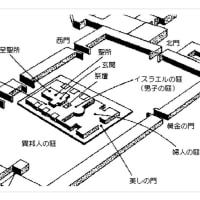エレミヤ7章 まことの神を認めていく
7章の預言は、BC608年、ヨシヤ王がエジプトの王パロ・ネコに殺された直後、エホヤキムが王位に就いた時代のものです。つまり、ここから新しい預言集になります。
1.エルサレムと神殿の終焉
エレミヤは主の神殿に立って語ります。時は、大きなお祭りの時であったようです。ですから、たくさんの人たちが、エレミヤの語ることを耳にしました。当時、イスラエルの人々は、この神殿があれば自分たちは安全であると考えていました(4節)。神がご自身の神殿を自ら壊されるはずがない、と考えていたからです。しかし、エレミヤは、はるか昔、エリという祭司がいた時代、シロの神殿に起こった例をあげて、その考えが間違っていると断言します(12節)。
かつてイスラエルの民は、当時の立派な神殿を建て上げる前に、神殿に代わる「会見の天幕」と呼ばれる宮を持っていました。それがシロに設置されるようになると(士師18:31)。そこで行われる祭儀は、年々盛大になり、内容も世俗化していきました。祭司エリの子たちの、行いの悪さも(1サムエル2章)、まさにそのような状況を反映していました。しかし、エレミヤの時代も同じでした。エレミヤは、イスラエルの民の信仰が、形式的、儀式的な道に進み、神ご自身のみことばといのちに結び付いていない状況を批判し、かつてイスラエルに下された裁きが同じように下ると警告するのです(14節)。
2.形ではない
何が問題だったのか。神は言います。「わたしは、あなたがたの先祖をエジプトの地から導き出したとき、彼らに全焼のささげ物や、いけにえについては何も語らず、命じもしなかった(22節)」と。一瞬そうだったのかな、と思うことばですが、確かに、神は、エジプトからイスラエルを連れ出し、シナイ山に到達するまで、一切そのようなことは語らず、ただ主を認め、主を恐れ、主の御声に聞き従うことを命じたのです。つまり、信仰の本質は、「聞けイスラエル」、神のことばに耳を傾け、「神が命じるすべての道に歩」むことにあります(23節)。
旧約聖書の最後の書、マラキ書が書かれた後、神は、イスラエルに預言者を遣わさず、まったく沈黙してしまった時代があります。その時代、約400年間、イスラエルの信仰は、完全に形式的な祭儀宗教、また律法主義的な宗教に変質してしまったと言われています。しかし、その時代が特殊だったのではないのです。既にエリ、そしてエレミヤの時代も同じでした。さらにイエスの時代も同じでした。イエスは、祭司たちに向かって、あなたがたは神殿を「強盗の巣」(11節)としていると指摘し、宮きよめをしたのです。となれば、現代においても、その状況は同じかもしれません。神の声に耳を傾けず(26節)という状況は、繰り返されてきたということです。しばしばキリスト者になれば、毎週礼拝に出て、毎日聖書を読み祈り、献金をささげ、奉仕に精を出すように教えられます。出来ていればよい信徒、そうでなければダメな信徒のように言われることがあります。しかしそれが、形ばかりのことであれば、いかに出来ていても、神はそのような信徒に「哀歌を歌え」(29節)と言うのです。大切なのは、神のことばに聞き、神のいのちに触れ、そこから自然に形作られる信仰生活や教会生活があるかどうかでしょう。見せかけではない、実質のある信仰を持つ歩みをしたいものです。では今日も良き一日となるように祈ります。
<クイズコーナー>
最初に、昨日のクイズです。次のうち、テコアが出身地の預言者は誰でしょうか?①エレミヤ、②アモス、③イザヤ、答えは②アモスでした。エレミヤはアナトテ、イザヤはエルサレム出身と考えられています。では今日の聖書クイズです。ヨシヤ王の死後、エジプトのパロ・ネコによって王位につけられたヨシヤの子は次の誰でしょうか。①エホヤキム、②エホヤキン、③エホアハズ。答えはまた明日。では今日も良き一日であるように祈ります。
Jeremiah 7: Acknowledging the True God
The prophecy in chapter 7 is from the time of Jehoiakim's ascension to the throne in 608 BC, shortly after King Josiah was killed by Pharaoh Neco, king of Egypt. In other words, this is a new collection of prophecies from this point on.
1. the end of Jerusalem and the temple
Jeremiah stands in the temple of the Lord and speaks. The time seems to have been a time of great festivals. Therefore, many people heard Jeremiah's words. At the time, the Israelites thought they would be safe with this temple (v. 4). They thought that God would not destroy his temple by himself. Jeremiah, however, affirms that they are wrong, citing the example of what happened to the temple at Shiloh long ago, when there was a priest named Eli (v. 12).
In the past, the Israelites had a palace called the "tent of meeting" to replace the temple before they built the magnificent temple of that time. When it came to be set up in Shiloh (Judges 18:31). The rituals held there became more grandiose and secularized in content from year to year. The bad behavior of the sons of Eli the priest (1 Samuel 2) reflected this very situation. But the same was true in Jeremiah's time. Jeremiah criticizes the Israelites' faith for going down the path of formality and ritual and not being connected to the Word and life of God Himself, and warns them that the same judgment that was once upon Israel will come upon them (v. 14).
2. not the form
What was the problem? God says. When I brought your ancestors out of the land of Egypt, I did not speak to them or command them anything about whole burnt offerings or sacrifices (v. 22)." For a moment, one wonders if this was so, but it is true that God did not speak of any such thing until He brought Israel out of Egypt and reached Mount Sinai, commanding them only to acknowledge the Lord, fear Him, and listen to and obey His voice. In other words, the essence of faith is to "listen, Israel," to hearken to the Word of God and "walk in all the ways God commands" (v. 23).
After Malachi, the last book of the Old Testament, was written, there was a period of time when God did not send prophets to Israel and was completely silent. It is said that during that period, about 400 years, Israel's faith was completely transformed into a formalistic ritualistic and legalistic religion. But that period was not unique. It was already the same in the time of Eli and Jeremiah. Moreover, it was the same in the time of Jesus. Jesus cleansed the temple by pointing out to the priests that you have made it a "den of robbers" (v. 11). The situation may be the same today, then. The situation of not listening to God's voice (v. 26) has been repeated. Often, when we become Christians, we are taught to go to worship services every week, read the Bible daily, pray, give offerings, and devote ourselves to service. We are sometimes told that if we can do this, we are a good congregation, and if not, we are a bad congregation. But if it is only a formality, no matter how well done, God tells such a congregation to "sing a song of lamentation" (v. 29). What is important will be whether there is a life of faith and church life that is formed naturally from listening to God's Word and being touched by God's life. We want to have a walk of faith that has substance, not pretense. I pray that today will be another good day.
<Quiz Corner
First, yesterday's quiz. Which of the following prophets is from Tekoa? (1) Jeremiah, (2) Amos, (3) Isaiah, and the answer was (2) Amos. Jeremiah is considered to be from Anathoth and Isaiah from Jerusalem. Now for today's Bible quiz. After the death of King Josiah, who was the son of Josiah who was put on the throne by Pharaoh Neco of Egypt? (1) Jehoiakim, (2) Jehoiachin, and (3) Jehoahaz. The answer will be given tomorrow. Now I wish you a good day.
















